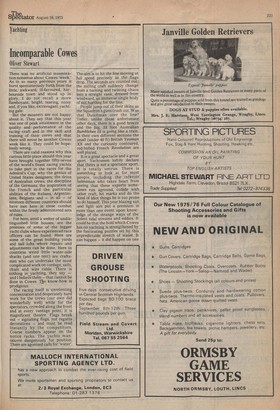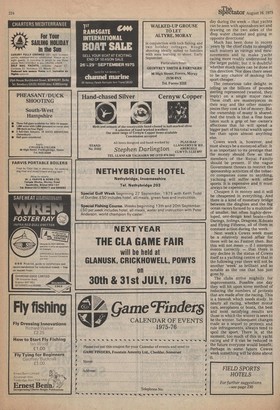Yachting
Incomparable Cowes
Oliver Stewart
There was no artificial insemination nonsense about. Cowes 'Week.' As in so many previous years it burst spontaneously forth from the little, awkward, ill-favoured, harbourside town and stood up in glory. I do not recall a more flamboyant, bright, tearing, noisy and, if you like, extravagant yachting gale.
But the moaners are not happy about it. They say that this year was one of peak attainment in the quality and performance of the racing craft and in the skill and training of their crews and that there will never be another Cowes week like it. They could be hopelessly wrong.
There are valid reasons why this curious little place should this year have brought together fifty-seven of the world's finest racing yachts to take part in the races for the Admiral's Cup; why the genius of United States designers; the drive of Australian crews; the discipline of the Germans; the inspiration of the French and the particular abilities of the Italians, Argentinians, Belgians and — in all — of nineteen different countries should have met here in close combat within the firmly administered sets of rules.
For here, amid a welter of undistinguished little houses, are the premises of some of the bigger yacht clubs where experienced race officers can be found. Here are some of the great building yards and sail lofts where repairs and adjustments can be done. Here in countless weird little water-side
• shacks (and one tent) are craftsmen who can undertake the most complicated work on cordage, sails, chain and wire cable. There is nothing in yachting, they say. — and I beliesie them — that cannot be done in Cowes. The know-how is prodigious.
The racing itself is unrelenting concentration and desperately hard work for the crews (our own did wonderfully well) while for the spectators, crowded along the front and at every vantage point, it is magnificent theatre. Flags break out — signalling flags, not regatta decorations — and must be read instantly by the competitors. Course numbers appear on the notice racks. The yachts manoeuvre dangerously for position. There are agonised calls for 'water'. The aim is to hit the line moving at full speed precisely as the flags drop. The seconds are counted out; the milling craft suddenly change from a turning and twisting chaos into a straight rank, dressed from windward, an immense single body of sail hurtling for the line.
People jump out of their skins as the Squadron's guns crash out. Was that Dutchman over the line? Today, unlike those unfortunate other days, there is a good breeze and the big, 53 foot Australian Bumblebee III is going like a train. In their own different sections the small (under 40 ft) British Yeoman XX and the curiously contoured, red-hulled French Revolution are well placed.
It is a great spectacle and a great sport. Yachtsmen loftily declare that theirs is not a spectator sport. It is totally untrue. There is something to look at for most people, including the inferior helmsman who takes heart from seeing that these experts sometimes run aground, collide with other_ craft, hit marks and do the kind of idiot things he is too prone to do himself. This year blazing sun and light airs put a premium in more than one event upon knowledge of the strange ways of the Solent tidal streams and eddies. It could be that the hold which Cowes has on yachting is strengthened by the fascinating puzzles set by this unpredictable stretch of water. It can happen — it did happen on one day during the week — that yachts can be seen with spinnakers set and drawing on the two sides of the deep water channel and going in opposite directions!
Much has been done in recent years by the chief clubs to simplify such matters as ratings and measurements and to make yacht racing more readily understood by the larger public; but it is doubtful whether much more can be done in this direction. Nor does there seem to be any chance of making the sport cheaper.
The censorious take delight in telling us the billions of pounds sterling represented (wasted, they imply) on a single major race. These craft are masterpieces in their way and like other masterpieces they cost a lot of money. But the ownership of many is shared. And the truth is that a fine boat takes such a grip of her owner's affections that he will spend a bigger part of his total wealth upon her than upon almost anything else.
Cowes week is, however, and must always be a moneyed affair. It is as important to. its prestige that the money should flow as that members of the Royal Family should be present. If the vague Government threats to restrict the sponsorship activities of the tobacco companies come to anything, yachting will suffer with other sports. It is expensive and it must always be expensive.
Cheapen it in money and it will be cheapened in everything. And there is a kind of monetary bridge between the dinghies and the big ocean racers formed by a multitude of smaller, but often highly-developed, one-design keel boats—the Darings, Solings, Dragons, X-boats and Flying Fifteens, all of them in constant action during the week.
Next week's Cowes week must be a relatively muted affair for there will be no Fastnet then. But this will not mean — if I interpret events correctly — that there is any decline in the status of Cowes itself as a yachting centre or that in the following year there will not be -another 'week' as brilliant and as notable as the one that has just gone by.
The clubs strive mightily for improvements. Possible one day they will hit upon some method of reducing the numbers of protests that are made after the racing. This is a blemish which needs study. In nearly all racing, whether motor cars, aeroplanes or boats, the best and most satisfying results are those in which the winner is seen to be the winner. Subsequent changes made as a sequel to protests and rule infringements, always tend to spoil the sport. There is, at the moment, too much of this in yacht racing and if it can be reduced in the future everyone would benefit. Perhaps in some future Cowes week something will be done about it.



































 Previous page
Previous page